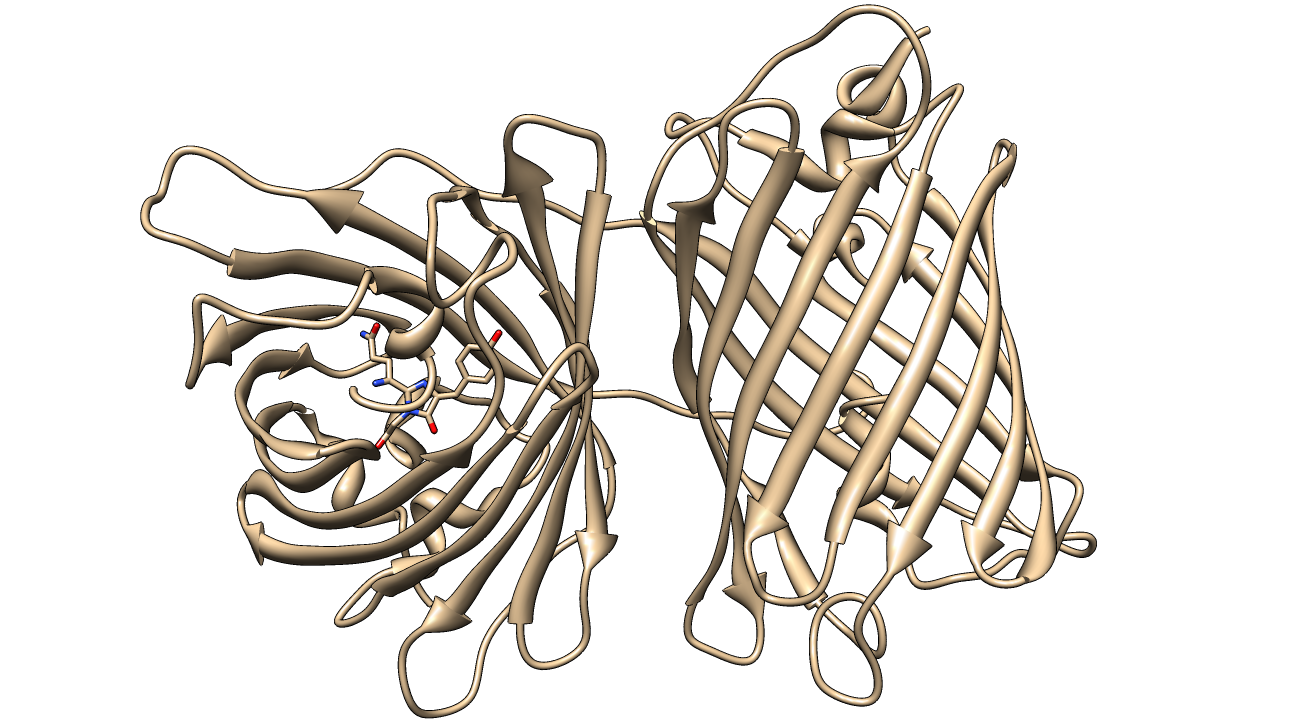Difference between revisions of "Part:BBa K1184000"
Enpederson (Talk | contribs) |
Enpederson (Talk | contribs) |
||
| Line 1: | Line 1: | ||
__NOTOC__ | __NOTOC__ | ||
<partinfo>BBa_K1184000 short</partinfo> | <partinfo>BBa_K1184000 short</partinfo> | ||
| − | [[image:KillerRed.png|600px|thumb|center|Crystal Structure of KillerRed (PDB ID: 3GB3)<sup>2,3,4</sup>]] | + | [[image:KillerRed.png|600px|thumb|center|Crystal Structure of KillerRed (PDB ID: 3GB3) with the QYG chromophore shown<sup>2,3,4</sup>]] |
<p>KillerRed is a red fluorescent protein that produces reactive oxygen species (ROS) in the presence of yellow-orange light (540-585 nm). KillerRed is engineered from anm2CP to be phototoxic. It has been shown that KillerRed produces superoxide radical anions by reacting with water. Superoxide reacts with the chromophore of KillerRed, causing it to become dark, which ultimately gives rise to a bleaching effect. KillerRed is spectrally similar to mRFP1 with a similar brightness. KillerRed is oligomeric and may form large aggregates in cells. Expression of KillerRed and irradiation with light may act a kill-switch for biosafety applications.</p> | <p>KillerRed is a red fluorescent protein that produces reactive oxygen species (ROS) in the presence of yellow-orange light (540-585 nm). KillerRed is engineered from anm2CP to be phototoxic. It has been shown that KillerRed produces superoxide radical anions by reacting with water. Superoxide reacts with the chromophore of KillerRed, causing it to become dark, which ultimately gives rise to a bleaching effect. KillerRed is spectrally similar to mRFP1 with a similar brightness. KillerRed is oligomeric and may form large aggregates in cells. Expression of KillerRed and irradiation with light may act a kill-switch for biosafety applications.</p> | ||
<p> | <p> | ||
Revision as of 07:17, 5 September 2013
KillerRed
KillerRed is a red fluorescent protein that produces reactive oxygen species (ROS) in the presence of yellow-orange light (540-585 nm). KillerRed is engineered from anm2CP to be phototoxic. It has been shown that KillerRed produces superoxide radical anions by reacting with water. Superoxide reacts with the chromophore of KillerRed, causing it to become dark, which ultimately gives rise to a bleaching effect. KillerRed is spectrally similar to mRFP1 with a similar brightness. KillerRed is oligomeric and may form large aggregates in cells. Expression of KillerRed and irradiation with light may act a kill-switch for biosafety applications.
Superoxide (O2•-) is the radical anion of molecular oxygen, which can react with protein side chains and lipids to harm cells.
This sequence is codon optimized for mammalian cells and has 14 rare proline codons for E. coli (CCC) and one rare arginine codon (AGA). Codon optimization should be taken into consideration if large amounts of the protein are required. Expression on a high-copy plasmid has produced detectable fluorescent signal, however.
Sequence and Features
- 10COMPATIBLE WITH RFC[10]
- 12COMPATIBLE WITH RFC[12]
- 21COMPATIBLE WITH RFC[21]
- 23COMPATIBLE WITH RFC[23]
- 25COMPATIBLE WITH RFC[25]
- 1000INCOMPATIBLE WITH RFC[1000]Illegal BsaI.rc site found at 151
Illegal BsaI.rc site found at 442

